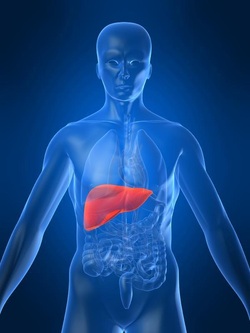
Weighing an average of 1.3kg (2.8lbs) in women and 1.8kg (4lbs) in men, the liver is located under the lower right hand side of your ribs. For comparison, the heart weighs an average of 255g (9oz) in women and 298g (10.5oz) in men.
The liver is large, and it has a large role in your everyday life. The liver is responsible for about 500 different functions, including aiding in digestion. The liver produces a substance called bile, which helps break down fat and it helps the body take up vitamins A, D, E, and K.
The liver also, famously, breaks down poisonous substances we consume, such as alcohol. A rough sketch of what happens when you drink alcohol:
When you drink alcohol, the alcohol is absorbed into your bloodstream from the stomach and the intestines. Your liver will break down the majority of the alcohol; the rest of the alcohol leaves your body in your urine, breath, and sweat. Your liver breaks down alcohol into acetaldehyde using an enzyme called alcohol dehydrogenase (ADH), then acetaldehyde is broken down into acetate with the enzyme aldehyde dehydrogenase (ALDH), and finally acetate is broken down into carbon dioxide and water. Your liver uses different enzymes to break down alcohol if there is a very large amount of alcohol in the bloodstream or, sometimes, if you drink regularly. (Side note: acetaldehyde is a nasty substance that can cause serious damage, so the accumulation of it can be harmful to your liver).
Interestingly, if you drink methanol (a type of alcohol not meant for consumption) it can kill you because the liver breaks down methanol into formaldehyde and formic acid. Methanol can be found in a variety of substances, such as antifreeze and copy machine fluid. If methanol is consumed, emergency care is necessary. Part of the emergency treatment for methanol poisoning involves giving the patient ethanol. Ethanol competes for ADH, preventing and slowing the breakdown of methanol.
The liver is also important in providing quick energy. Carbohydrates are broken down into glucose in the liver, and stored as glycogen in the muscles and liver if there is a surplus. If you suddenly find yourself running for your life, your muscles can use the stored energy, but when they run out, the liver provides more.
Your liver also stores iron, produces enzymes and other proteins responsible for blood clotting and tissue repair, and, as if the liver wasn’t awesome enough, it can also regenerate itself after serious damage.

 RSS Feed
RSS Feed
